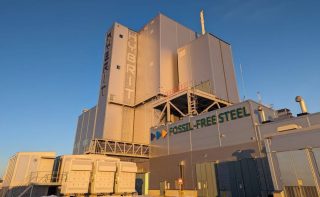-
HYBRIT steel process prepares for industrial expansion in Sweden
Date posted:
-
-
-
Post Author
Greg Kelsall
-
-
![]()
The HYBRIT initiative has presented the results of six years of research in a final report to the Swedish Energy Agency. According to the report, direct reduced iron produced with the HYBRIT process has superior characteristics compared to iron produced with fossil fuels. HYBRIT has applied for and received several patents based on the successful results, and the project is now continuing in the next phase where the process is to be implemented on an industrial scale.
The initiative is a collaboration between the steel company SSAB, the mining company LKAB and the energy company Vattenfall. Described previously in an IFRF blog, the process aims to virtually eliminate carbon dioxide emissions in the steel industry by replacing coal and coke in the production of iron with fossil-free hydrogen and electricity. The transition from coal and blast furnace-based steel making to HYBRIT technology and the melting of iron in electric arc furnaces could reduce Sweden’s total carbon dioxide emissions by more than 10%.
The project is the first in the world to demonstrate that the fossil-free value chain from iron ore to steel, works on a semi-industrial scale. So far, more than 5,000 tonnes of hydrogen-reduced iron have been produced at HYBRIT’s pilot plant in Luleå.
A 24-page summary of the report is available to download, with key results from the HYBRIT project from 2018-2024 provided below:
- Development of a new hydrogen-based technology that enables efficient fossil-free iron and steel production with <0.05 tonnes of CO2 emissions per tonne of steel (scope 1 and 2). This small level of emission is due the consumption of graphite electrodes and the addition of slag formers in the electric arc furnace, and compares to typical values for ore-based steelmaking with blast furnace technology of 2.2 tonnes CO2e/tonne steel.
- Development of a new iron product, sponge iron, which has significantly better properties than iron reduced with fossil gases such as natural gas. Examples given are that the iron product is carbon-free and has a high metallisation degree (98-99%), is more resistant to mechanical pressure drops and abrasion than comparable industrial references, and has stable chemical properties.
- HYBRIT’s process converts iron ore pellets into iron (sponge iron) using fossil-free hydrogen, with water as the only by-product. This differs from conventional direct reduction technologies that rely on natural gas, which emits carbon dioxide. Direct reduction with hydrogen and melting in an electric arc furnace produces 42 kg of biogenic CO2 per tonne of directly reduced iron, compared to 383 kg of fossil CO2 per tonne in a conventional natural gas process where the heating of the reduction gas is excluded from the comparison.
- Development of a new fossil-free and competitive industrial process where 175 process modes have been tested to identify the most favourable way to produce iron with hydrogen.
- Successful long-term operation of alkaline electrolysers for hydrogen production and storage. The electrolysers are used to split water into hydrogen and oxygen using fossil-free electricity. The hydrogen is then used to remove the oxygen from the iron ore pellets. Tests using stored hydrogen in real time against the electricity market show that the variable cost of hydrogen production can be reduced by up to 40%.
- Development of an efficient process practice for melting fossil-free sponge iron into crude steel in an electric arc furnace, carried out in collaboration with the Swerim research institute. The steel is produced by melting the fossil-free sponge iron with fossil-free electricity together with minimal additions of biocarbon, oxygen and slag formers. The experimental results show that the fossil-free melting practice developed produces a steel of the same high quality as today’s fossil ore-based steel.
Results from the pilot phase pave the way for implementing the HYBRIT process on an industrial scale. Hybrit Development AB will continue to conduct research and development to support the industrialisation of the technology together with the owner companies, including delivering solutions to LKAB’s planned demonstration plant in Gällivare. The pilot project for storing fossil-free hydrogen in Svartöberget in Luleå will continue until 2026.
The HYBRIT project has been awarded funding by the EU Innovation Fund and by Industriklivet. It is also part of the European IPCEI project Hy2Use (Hydrogen), which involves a total of 35 projects from 12 countries to support rapid transition and increase the competitiveness of the European industrial sector.

